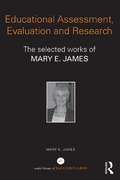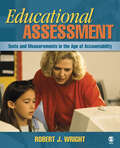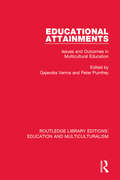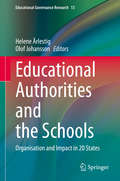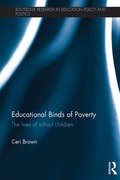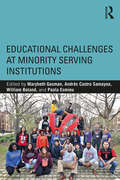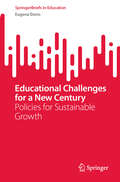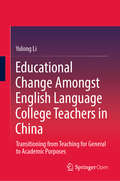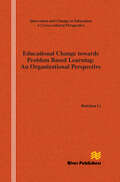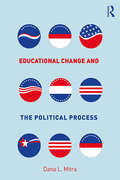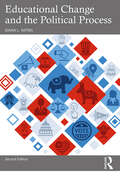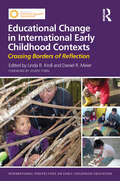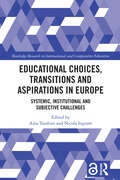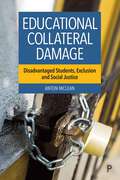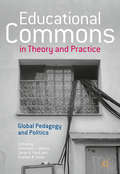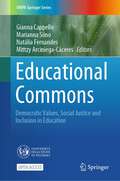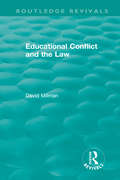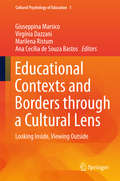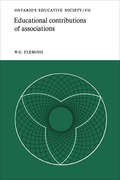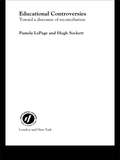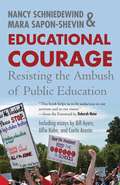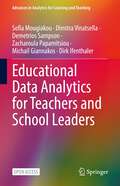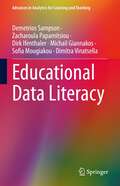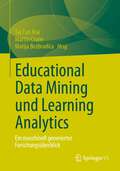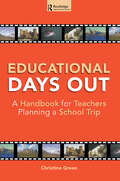- Table View
- List View
Educational Assessment, Evaluation and Research: The selected works of Mary E. James
by Mary E. JamesIn the World Library of Educationalists, international experts themselves compile career-long collections of what they judge to be their finest pieces � extracts from books, key articles, salient research findings, major theoretical and practical contributions � so the world can read them in a single manageable volume, allowing readers to follow th
Educational Assessment: Tests and Measurements in the Age of Accountability
by Robert J. WrightGrounded in the real world of public schools and students, this engaging, insightful, and highly readable text introduces the inner-workings of K–12 educational assessment. There has never been a time when it is more important for educators to have an understanding of testing and assessments. Accountability is now a fact of life for all public school educators, and testing is at the core of all educational assessment programs. It is no longer prudent or even possible for educators to ignore this national zeitgeist. Educational Assessment: Tests and Measurements in the Age of Accountability addresses all of the constructs central to understanding the design, construction and evaluation of educational measures. It goes on to provide students with insight into the link between today′s high-stakes testing mandates and the traditions of the past 125 years of "scientific" measurement in the United States. It addresses the problem of understanding and correctly interpreting test scores on local, statewide, national, and international assessments. It also addresses how certain issues such as institutionalized cheating, test preparation, and individual differences among students and their families influence test score outcomes. Key Features Covers traditional topics in an approachable and understandable way: Reliability, validity, performance assessments, standardized achievement tests, and many more topics are included. Analyzes and interprets "hot-button" issues of today′s complex measurement concerns: The score-gap, high-stakes testing, grade retention, drop-out crises, "academic redshirting,", diversity, family influence, and educational technology, are examined. Relates theory to practice: Each chapter includes relevant real-life examples and case studies to demonstrate how the technical-measurement principles impact those involved. Addresses the needs of diverse students: Issues related to students with special needs and the testing of English Language Learners are discussed. Intended Audience: Educational Assessment: Tests and Measurements in the Age of Accountability has been written to meet the needs of students in graduate programs of special education, reading, school counseling, school social work, curriculum supervision, or administration. Providing grounding in all aspects of measurement, this book is perfect for undergraduate and graduate courses such as Educational Tests and Measurements, Assessment in Education, and Student Assessment.
Educational Attainments: Issues and Outcomes in Multicultural Education (Routledge Library Editions: Education and Multiculturalism #9)
by Peter Pumfrey Gajendra VermaOriginally published in 1988. This book presents an account of some of the challenges to society involved in multicultural education, together with recent empirical evidence concerning the educational attainments of British pupils of Afro-Caribbean, Asian and British origins. Promising policies and practices are identified. Individuals from different ethnic groups and professional orientations have contributed to this book. The first six chapters are devoted to contemporary, complex and controversial issues; the final six chapters present empirical evidence from national and local studies.
Educational Authorities and the Schools: Organisation and Impact in 20 States (Educational Governance Research #13)
by Olof Johansson Helene ÄrlestigThis book describes and analyses the organisation, functions and development of national educational authorities and agencies and the influence they have on local schools in 20 countries around the world. It examines the governing chain in the respective countries from both a theoretical and descriptive perspective. It does so against the background of the stability and rigour of the governing chains having been challenged, with some researchers considering the chain to be broken. However, the view that comes to the fore in this book is that the chain is still present and contains both vertical implementation structures and intervening spaces for policy interpretation. How schools become successful is important for the individual students as well as the local community and the national state. A vast quantity of research has looked at what happens in schools and classrooms. At the same time, national governance and politics as well as local prerequisites are known to exert influence on schools and their results to a high degree. Societal priorities, problems and traditions provide variety in how governance is executed. This book provides an international overview of the similarities and differences between educational agencies and how their work influences schools.
Educational Binds of Poverty: The lives of school children (Routledge Research in Education Policy and Politics)
by Ceri BrownShortlisted for BBC Radio 4's Thinking Allowed's second Ethnography Awards in partnership with the British Sociological Association! Educational Binds of Poverty tackles the assumptions made by many recent social and educational policy initiatives suggesting that the best way to improve educational prospects of children in poverty is through an increased emphasis upon a culture of control, discipline, regulation and accountability. In this book, Ceri Brown presents these assumptions against a review of the research literature and an original ethnographic longitudinal study into the lives of children in poverty, in order to highlight the gap between policy discourses and the lived experiences of children themselves. Through the theoretical concept of a set of ‘binds’ against educational success, the book explores four key areas that children in poverty have to navigate if they are to be successful in school. These are: material deprivation the cultural contexts of school, home and the community friendship and social capital the effects of student mobility through atypical school changes. In seeking to characterise and explain what life is like for young school children, this book questions why policy makers have a radically different frame of reference in purporting to understand how their policies will change the behaviour of those living in poverty. This leads onto a consideration of what lessons may be learned in order to contribute towards a more appropriate policy agenda that attends to the multiple binds that children in poverty have to negotiate.
Educational Challenges at Minority Serving Institutions
by Marybeth Gasman Andrés Castro Samayoa William Casey Boland Paola Lola" EsmieuMinority Serving Institutions (MSIs) are responsible for educating 20 percent of the nation’s college students and nearly 40 percent of the nation’s students of color. This growing group of institutions is essential to higher education and moving toward a more equitable society. This important book focuses on the challenges faced by MSIs within the larger higher education context and provides practical solutions to address these challenges. From performance-based funding, to issues of being dually designated MSIs, to articulation agreements with community colleges, to college readiness, the authors tackle the most important topics in higher education by exploring these varied topics through the lens of MSIs.
Educational Challenges for a New Century: Policies for Sustainable Growth (SpringerBriefs in Education)
by Eugene EterisThis book unravels the ‘new reality’ of national educational reforms, exploring optimal strategic directions for education and training. Offering a particular emphasis on EU-wide political guidelines, it encompasses lifelong learning across all levels, and it showcases the pivotal role of modern skills in education for reducing poverty, promoting gender equality, and enhancing lifestyles. Discussing how reformed education is vital for a robust national response, the book emphasizes the social responsibility inherent in educational policy. It advocates for reforms to overhaul content, enhance teaching pedagogical skills, and impart socially valuable and responsible knowledge. It further identifies how strategic focus on education and training holds the potential to enrich innovation, competitiveness, employability, and productivity. Designed to inform scholars, policymakers, and professionals influencing national educational reforms amid contemporary challenges. This book provides essential insights into the evolving educational landscape and its impact on societal progress.
Educational Change Amongst English Language College Teachers in China: Transitioning from Teaching for General to Academic Purposes (Springerbriefs In Education Ser.)
by Yulong LiThis open access book provides anthropological insights into the arduous yet rewarding journeys involved in selected TESOL teachers’ pedagogical transition to teaching English for Academic Purposes (EAP) at universities in Shanghai, the largest metropolitan area in China. Applying a unique combination of ethnography and phenomenology, the book offers innovative new perspectives on teacher education research. Drawing on the latest language education theory, it outlines a practitioner-friendly approach to EAP literacy. Teacher readers will especially benefit from the case studies presented here, which provide role models for teacher change in educational reform, as well as advice on their academic careers. In addition to addressing a timely and important research gap on EAP teachers in non-Western countries, the book is the ideal choice for readers interested in an update on English education in China.
Educational Change Towards Problem Based Learning: An Organizational Perspective
by Huichun LiIn order to address the research concern, this book involves in an intensive exploration of two universities which are transforming their traditional educational approaches to PBL.
Educational Change and the Political Process
by Dana L. MitraEducational Change and the Political Process brings together key ideas on both the system of educational policy and the policy process in the United States. It provides students with a broad, methodical understanding of educational policy. No other textbook offers as comprehensive a view of the U.S. educational policy procedure and political systems. Section I discusses the actors and systems that create and implement policy on both the federal and the local level; Section II walks students through the policy process from idea to implementation to evaluation; and Section III delves into three major forces driving the creation of educational policies in the current era—accountability, equity, and market-driven reforms. Each chapter provides case studies, discussion questions, and classroom activities to scaffold learning, as well as a bibliography for further reading to deepen exploration of these topics.
Educational Change and the Political Process
by Dana L. MitraEducational Change and the Political Process brings together key ideas on both the system of educational policy and the policy process in the United States. It provides students with a broad, methodical understanding of educational policy. No other textbook offers as comprehensive a view of the US educational policy procedure and political systems. Section I discusses the actors and systems that create and implement policy on both the federal and the local level; Section II walks students through the policy process from idea to implementation to evaluation; and Section III delves into three major forces driving the creation of educational policies in the current era—accountability, equity, and market-driven reforms. Each chapter provides case studies, discussion questions, and classroom activities to scaffold learning, as well as a bibliography for further reading to deepen exploration of these topics. This new edition will explore recent Trump-era and post-Trump era US politics and policy changes as well as the politics of race.
Educational Change in International Early Childhood Contexts: Crossing Borders of Reflection (International Perspectives on Early Childhood Education)
by Daniel R. Meier Linda R. KrollCo-published with the Association for Childhood Education International (ACEI), Educational Change in International Early Childhood Contexts: Crossing Borders of Reflection examines the role of teacher reflection in a variety of educational contexts worldwide. Using a case study approach that integrates research, theory, policy, and practice, international contributors show how, in some settings, local traditions and values are honored while, in others, international educational ideas and programs become modified to suit local needs. Cases from Japan, China, Palestine, South Africa, Kenya, Finland, Italy, and New Zealand are discussed, as well as models from the United States. Through its thorough investigation into teacher reflection practices throughout the world, Educational Change in International Early Childhood Contexts: Crossing Borders of Reflection focuses on the transformative value of these practices to promote change in early childhood education. Framing commentary from Linda R. Kroll and Daniel R. Meier provides context and places the case studies in conversation with one another, allowing for productive international comparisons in this dynamic collection.
Educational Choices, Transitions and Aspirations in Europe: Systemic, Institutional and Subjective Challenges (Routledge Research in International and Comparative Education)
by Nicola Ingram Aina TarabiniEducational Choices, Transitions and Aspirations in Europe analyses educational choices and transitions in eight different European countries/regions and provides an engaging means of considering issues of inequality through international comparisons. The book is underpinned by explorations of theoretical perspectives and methodological approaches, which share the common goal of highlighting and challenging educational inequalities in relation to political imaginings and discursive constructions of notions of aspirations and choice. Beginning with an overview of the theoretical landscape, the book posits ways of understanding transitional experiences through both a social and a political lens. Comprising of chapters that explore these issues within the context of specific countries and at different stages of young people’s transitions, the collection examines the features of different European education systems and how they frame transitions and choices, before providing an overall analysis of systemic, institutional and subjective constraints on these processes. The book uniquely opens and develops an intellectual conversation about different education systems with similar educational challenges and outcomes. Assimilating key issues and solutions, this volume also makes general recommendations for policy and practice that would help to promote greater equity and social justice. The book covers a range of transition points and countries, which should make it essential reading for academics, researchers and postgraduate students with an interest in international perspectives on education. It will be particularly useful for those working in education, sociology, social policy, geography, and politics.
Educational Collateral Damage: Disadvantaged Students, Exclusion and Social Justice
by Anton McLeanWhy do disadvantaged students continue to get a poor deal as they progress through England’s education system? Challenging orthodox thinking about school exclusion, this book powerfully advocates for a fairer education system for disadvantaged students. It argues that the current conceptualisation of ‘exclusion’ – physically removing the student from the school – is insufficient. This approach fails to recognise the layers of exclusion that these students encounter. Students can be excluded within their schools (inner exclusion), not just from school (outer exclusion). Drawing on student experiences of exclusion and the perspectives of senior leaders, including the author who is a Head of School, this book demonstrates how we can create a fairer education system for disadvantaged students.
Educational Commons in Theory and Practice: Global Pedagogy and Politics
by Alexander J. Means Derek R. Ford Graham B. SlaterIn this volume, critical scholars and educational activists explore the intricate dynamics between the enclosure of global commons and radical visions of a common social future that breaks through the logics of privatization, ecological degradation, and dehumanizing social hierarchies in education. In its institutional and informal configurations alike, education has been identified as perhaps the key stake in this struggle. Insisting on the urgency of an education that breaks free of the bonds of enclosure, the essays included in this volume weave together bright threads of radical thought into a vivid tapestry illustrating a critical framework for enacting a global educational commons.
Educational Commons: Democratic Values, Social Justice and Inclusion in Education (UNIPA Springer Series)
by Natália Fernandes Gianna Cappello Marianna Siino Mittzy Arciniega-CáceresThis open access book presents the final findings from the case studies developed within the Horizon 2020 SMOOTH project Educational Spaces. Passing through Enclosures and Reversing Inequalities through Educational Commons. The overall objective of the project was to understand, develop, and accelerate the potential impact of education on reversing inequalities for active social inclusion of children and young people at risk in Europe, through introducing the emergent paradigm of the “commons” as an alternative value and action system in the field of education (preschools, schools, and after-school programs). SMOOTH critically draws out the implications of the commons for refiguring education and for social change in general, on a footing of equality, sharing, participation, togetherness, caring, and freedom. Universities, research laboratories, municipalities, NGOs, museums, and youth organizations, in different European countries, have worked together to achieve the aboveaim involving almost 200 educators and teachers, and 800 children, and providing interesting insights and suggestions on how to implement educational commons in many different educational contexts. The target audience comprises policymakers and education leaders, students from Education and Communication degrees, researchers, and educators from both formal and non-formal educational contexts.
Educational Conflict and the Law (Routledge Revivals)
by David MilmanPublished in 1986 this book considers how relationships within the education system are growing more complicated as staff, pupils and parents are increasingly aware of their legal rights and willing to assert them. It discusses possibilities for conflict such as growing teacher militancy and an emphasis on staff development and appraisal causing tension. The book also considers moves towards accountability and the increasing involvement of governors and teachers presenting further sources of conflict. Finally, it looks as truancy and other pupil difficulties involving legal issues. Teachers, headmasters, and other concerned parties are frequently unaware of the precise nature of their rights and responsibilities. However, underlying and regulating all educational activities is educational law as set out in various Acts of Parliament. This book provides a comprehensive overview of educational law from 1986 and discusses how it relates to controversies in education. It covers all aspects of the topic including the administrative arrangements, the independent sector, multiracial education and teachers’ contractual obligations.
Educational Contexts and Borders through a Cultural Lens
by Giuseppina Marsico Virgínia Dazzani Marilena Ristum Ana Cecília de Souza BastosThis book provides a "context" of discussion for researchers and educational experts in order to rethink the relationship between actors, practices and borders within the educational contexts. The research in educational psychology has often challenged the concept of "educational context". According to the different theoretical frameworks, the construct of contexts, their borders and the dimensions to be taken into account have all been defined in different ways. The book offers a reflection that goes from theory to practice and backward from practice to theory. The main research questions the book addresses are how actors, i. e. teachers, parents and students, educators and professionals, with their own identity and social representations, build their educational practices or their shared cultural spaces where knowledge is generated, defining the borders of the educational contexts. The book proposes that a border is a type of membrane within and outside the educational setting bringing together different actors, groups and cultures. The book presents the perspectives of scholars and educational experts from various parts of the world, including Brazil, Argentina, Italy, Japan, and the United Kingdom. They shed light on what happens at the border in different cultural contexts and what the relationship is between the educational setting and the other life contexts or micro-cultures.
Educational Contributions of Associations: Ontario's Educative Society, Volume VII
by W. G. FlemingThe influence of educational associations is often overlooked in treatises on Ontario's educational system because these groups tend to operate in an informal manner. This volume discusses the various types of educational organizations, their purposes, the scope and nature of their activities, and their contributions to education. It includes professional organizations, and a wide variety of groups with a direct or peripheral interest in education in its broad definition.
Educational Controversies Towards a Discourse of Reconciliation: Toward A Discourse Of Reconciliation
by Hugh Sockett Pamela LapageFor the last 100 years, people have argued vigorously about a vast number of educational issues. At the heart of the arguments lies the question: What is the purpose of education? This conflict of educational purpose has seen rifts between academics, educators, politicians and parents. The authors of this book don't believe the conflicts need to be so hysterical, nor that the oppositions are incompatible. Rather, that it is in the manner in which debate is conducted that is so damaging. In this book, the authors contend that there are political, social, moral and civic needs for a new stance to debate the way forward. Examining a number of key controversies in educational discourse the book suggests ways in which controversies may be reconciled by looking for interrelations, mutual dependencies and links of importance. It develops current debate and provides suggestions for developing nurturing and supportive learning communities and so lead to educational change.
Educational Courage: Resisting the Ambush on Public Education
by Mara Sapon-Shevin Nancy SchniedewindLost amid the debate over educational policies are the stories of the educators, parents, and students who are most affected by legislation such as No Child Left Behind and Race to the Top. In Educational Courage, veteran educators and activists Nancy Schniedewind and Mara Sapon-Shevin bring together the voices of those who are resisting market-driven initiatives such as high-stakes testing, charter schools, mayoral control, and merit pay. The diverse narrators who write in this volume confront the educational agendas that undermine teachers' judgment and knowledge, ignore the different backgrounds of students and parents, and debase the learning process. Yet these educators, parents, and activists also offer stories of resistance and hope as they fight to uphold the ideals of democratic public education.From the Trade Paperback edition.y stories of resistance--of educators, parents, and education activists fighting mightily to uphold the ideals of democratic public education. In doing so, they inspire others to do the same.From the Trade Paperback edition.litarian, democratic ideal in the sphere of public education.*70,000 wordsTo view a video of Macario Guajardo, whose story is told in Educational Courage, explaining why he became a conscientious objector against the Texas state standardized tests, go to http://www.youtube.com/watch?v=eCI8qgcdwQ4
Educational Data Analytics for Teachers and School Leaders (Advances in Analytics for Learning and Teaching)
by Dirk Ifenthaler Demetrios Sampson Michail Giannakos Zacharoula Papamitsiou Sofia Mougiakou Dimitra VinatsellaEducational Data Analytics (EDA) have been attributed with significant benefits for enhancing on-demand personalized educational support of individual learners as well as reflective course (re)design for achieving more authentic teaching, learning and assessment experiences integrated into real work-oriented tasks.This open access textbook is a tutorial for developing, practicing and self-assessing core competences on educational data analytics for digital teaching and learning. It combines theoretical knowledge on core issues related to collecting, analyzing, interpreting and using educational data, including ethics and privacy concerns. The textbook provides questions and teaching materials/ learning activities as quiz tests of multiple types of questions, added after each section, related to the topic studied or the video(s) referenced. These activities reproduce real-life contexts by using a suitable use case scenario (storytelling), encouraging learners to link theory with practice; self-assessed assignments enabling learners to apply their attained knowledge and acquired competences on EDL. By studying this book, you will know where to locate useful educational data in different sources and understand their limitations; know the basics for managing educational data to make them useful; understand relevant methods; and be able to use relevant tools; know the basics for organising, analysing, interpreting and presenting learner-generated data within their learning context, understand relevant learning analytics methods and be able to use relevant learning analytics tools; know the basics for analysing and interpreting educational data to facilitate educational decision making, including course and curricula design, understand relevant teaching analytics methods and be able to use relevant teaching analytics tools; understand issues related with educational data ethics and privacy.This book is intended for school leaders and teachers engaged in blended (using the flipped classroom model) and online (during COVID-19 crisis and beyond) teaching and learning; e-learning professionals (such as, instructional designers and e-tutors) of online and blended courses; instructional technologists; researchers as well as undergraduate and postgraduate university students studying education, educational technology and relevant fields.
Educational Data Literacy (Advances in Analytics for Learning and Teaching)
by Dirk Ifenthaler Demetrios Sampson Michail Giannakos Zacharoula Papamitsiou Sofia Mougiakou Dimitra VinatsellaDigital Education is recognised as a key transformative innovation for K-12 school and university teaching and learning, as well as, for professional development and vocational training. As a result, blended and online courses are nowadays widely deployed to meet the needs of K-12, higher education and vocational training students, as well as, the needs for professional development of in-service professionals. In this context, important professional roles in digital education and training, such as, the Instructional Designers, who design and develop online and blended courses, and the Trainers or Tutors who support the delivery of these online and blended courses, require new professional competences compared to those assumed at the traditional face to face education and tra ining programs.This is particularly relevant today, in the post Covid-19 era, where educational organisations, leaders and teachers are challenged with reinventing their teaching and learning environments to offer higher quality, more accessible and inclusive teaching, learning and assessment. Educational Data Literacy (EDL) is a core competence for all education professionals, including school teachers, instructional designers and tutors of online and blended learning courses, as well as educational institutions' leaders. Nevertheless, existing professional competence frameworks for educators pay little attention to EDL, missing out the potential of using emerging EDL methods and tools in online and blended teaching and learning - thus there is a need for extending existing professional competence frameworks for educators with new competences to accommodate the emerging field of EDL. To this end, this brief monograph presents a comprehensive proposal of an Educational Data Literacy Competence Profile (EDL-CP) framework for education professionals, as well as, exemplary learning outcomes for the proposed EDL-CP framework, and use-case examples for indicative target groups, namely instructional designers, e-Trainers and K-12 school teachers. The work of this book has been produced within the project "Learn2Analyze — An Academia-Industry Knowledge Alliance for enhancing Online Training Professionals’ (Instructional Designers and e-Trainers) Competences in Educational Data Analytics" which is co-funded by European Commission through the Erasmus+ Program (Cooperation for innovation and the exchange of good practices – Knowledge Alliances).
Educational Data Mining und Learning Analytics: Ein maschinell generierter Forschungsüberblick
by Tai Tan Mai Martin Crane Marija BezbradicaDas Buch bietet einen umfassenden Überblick über den neuesten Stand der Forschung auf dem Gebiet des Data Mining im Bildungswesen und seiner Anwendungen. Es richtet sich an ein Publikum mit unterschiedlichem Hintergrund von Informatiker:innen bis zu Bildungsphilosoph:innen.
Educational Days Out: A Handbook for Teachers Planning a School Trip
by Green, ChristineDetailing how to plan and prepare for a school trip, this text provides advice on the right and wrong way to approach trips that will both educate and entertain. A directory of places of interest grouped into subject-specific sections is included.
